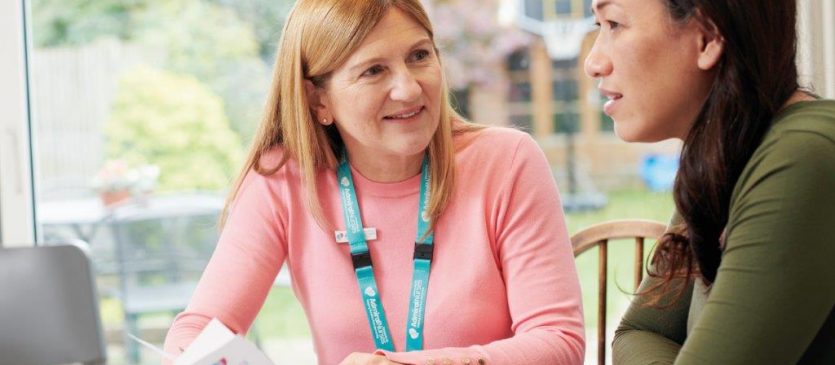
Christmas can be a difficult time of the year for people affected by dementia. Dementia specialist Admiral Nurses from Dementia UK have put together a list of tips to help the holiday season to be a little less stressful.
Plan ahead
Over the Christmas period, services like pharmacies, shops, GPs, dentists and mental health services have reduced opening hours. To make sure you’re not caught out, try to get things sorted in good time before you start celebrating with friends or family.
Get the shopping done well in advance, order and collect any prescriptions you or the person you care for will need, and organise paid care cover if necessary.
Write a list of out of hours contacts for services like the GP, emergency dentist, pharmacies, mental health services and social services, so you can relax knowing you’re prepared if anything happens.
If you’re visiting friends or family, especially if you’re staying over, pack well in advance so you can double-check that you haven’t forgotten anything.
Avoid surprises
If you’re celebrating with guests or visiting friends or relatives, make sure they know beforehand that your loved one has dementia. If it’s easier or helpful, you could just tell them that the person has memory problems, and ask them to keep conversations clear and simple.
If your friends, family or guests know that the person has dementia, but haven’t seen them in a while, let them know of any changes to expect.
It’s good to involve the person with dementia when planning activities, if you can – make sure they know what’s going to happen, and that they’re happy with it, but equally, try not to overload them with too many choices or expectations, as some people with dementia can find this overwhelming.
Think about food and drink
Try to follow your loved one’s normal likes and dislikes when it comes to food and drink.
If they have a smaller appetite, keep their portions small, and talk them through what’s on their plate if that would help them. Check in with them during the meal to see if they are managing, and discreetly offer help, if needed.
If the person enjoys an alcoholic drink, they should be free to enjoy one, but bear in mind that some alcohol can interfere with some medication or can be disorientating for a person with dementia.
Be kind to yourself
Christmas can be especially difficult if you’re spending it alone – perhaps your loved one has moved into care, or you’ve been bereaved. Give yourself time to process your feelings, be kind to yourself, and spend your Christmas in whatever way you need to.
Coping with loss and bereavement can take a long time, and even if you thought you were doing okay, you might experience a ‘dip’ around a family-oriented time like Christmas.
If you need someone to talk to, the Admiral Nurse Helpline can provide support every day except Christmas Day.
Avoid overstimulation
The noise of a busy family Christmas can be overwhelming for a person with dementia, so try to avoid overstimulating them with sights and sounds.
If you can, reduce unnecessary noise like Christmas crackers and loud music, and limit competing noises – for example, turn off the TV if people are talking.
Children can be a great distraction and source of enjoyment, but you may need to monitor the amount of time the person with dementia spends with young visitors, and look out for signs that they’re becoming tired or that noise levels are getting difficult for them to tolerate.
Keep activities short, with a pause every 30-40 minutes, and if you can, set aside a quiet room where they can have some downtime. You can make an unfamiliar room welcoming by bringing one of the person’s sofa cushions from their home, spraying a familiar scent or playing music they love.
Keep to routines
People with dementia often benefit from knowing what’s going to happen next, so it can be helpful to try to uphold some of their normal routines, even if they’re not at home for Christmas.
Do they have meals at a set time? Or a cup of tea in bed every morning? Do they watch a favourite programme at the same time every day? Try to support these routines where you can.
Think of engaging activities
Try to think of things to do that might engage or evoke memories for the person with dementia. For example, you could build a scrapbook together using photos from previous family Christmases or revive family traditions like playing charades or singing familiar songs together.
Find out about support groups in your area
If you’re caring for someone this Christmas, or spending the day alone, find out about support groups near you. Local centres might be holding a lunch or a meet-up – it might be comforting to spend time with other people in a similar situation to you, even if going out feels like a lot of effort.
Charity organisations like your local Age UK may have details of events happening over the festive period, and you may also be able to find information in local social media groups and through your GP surgery.
Don’t overdo it
Keep in mind what is manageable for the person with dementia. Allow your loved one to have a nap at lunchtime if they need to, and if they’re going back to their home at the end of the day, don’t leave it too late – try to take them home in daylight so they can see they’re back in their familiar environment, rather than waiting until it gets dark when they may be more confused ordisorientated.
Have a practice run
If you’re bringing a loved one with dementia out of their care home over the festive period, have a few practice runs. This will help you figure out if it’s realistic and achievable to take them out of their care home for Christmas.
Include the care home staff in your planning and ask them for their advice and how they might be able to support you.
If you’re anxious that your loved one won’t want to leave you at the end of the day, you could say “We have to go home now,” rather than “You have to go home.” If you’re doing things together, it can make things less confusing or frightening.
Once you arrive back at the home, go in with the person and have an activity ready like having a drink or showing their carer a gift that they received. Ask the staff to be there to welcome you back and distract your relative when you have to leave.
Include the person with dementia
Make sure you include the person with dementia in your Christmas activities. If appropriate, you could ask them to help you wrap presents, put up decorations, set the table or peel potatoes.
If you’re celebrating Christmas with other people, give them pointers beforehand on how to make the person with dementia feel happy and included. Sometimes, when people know someone has a diagnosis of dementia, they behave differently towards them – for example, they might avoid speaking to the person for fear that they’ll get it wrong.
If you think this could be the case, advise your guests to make sure they smile and make eye contact with the person with dementia and, if helpful, keep conversations with them straightforward.
Give yourself a break
Christmas can be a stressful time – perhaps you have expectations of previous family Christmases to live up to; maybe relationships between relatives are strained; or you might be worried about how the change in routine will affect your loved one with dementia.
If you’re entertaining or cooking a big meal, try not to put too much pressure on yourself to make everything perfect – enjoy the day for what it is, and accept any help offered by others.
If you’re not visiting or having visitors, try to find time to do whatever brings you some peace – you could put on music you enjoy, or a film you love.
If you’re a carer, why not ask a friend or relative to sit with the person you care for while you take a break for a few hours?
Sources of support
To speak to a dementia specialist Admiral Nurse about managing the festive season or any other aspect of dementia, please contact the free Helpline on 0800 888 6678 (Monday-Friday 9am-9pm; Saturday, Sunday and bank holidays 9am-5pm, every day except 25th December) or email helpline@dementiauk.org

